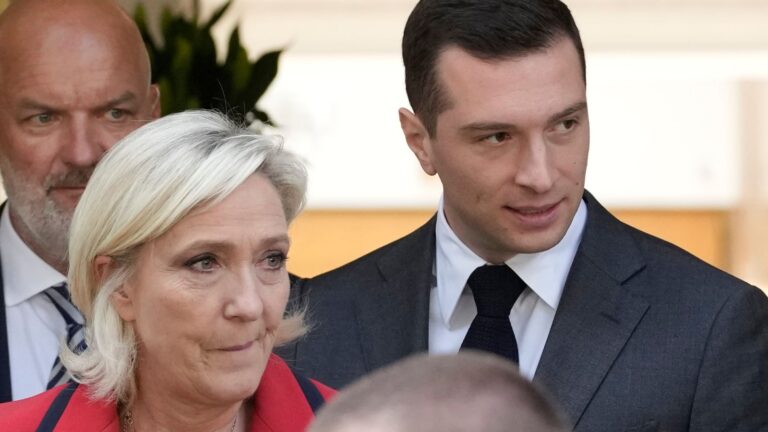With three days to go until France’s crucial parliamentary elections, the leader of the department’s far-right party raised the question on Thursday of who would take command of the army if his party takes power after two rounds of voting.
The early elections have plunged France into uncharted territory, with political scientists scrambling to interpret how power would be shared with President Emmanuel Macron and a prime minister hostile to many of his policies if Marine Le Pen’s National Rally wins a majority in France’s lower house, the National Assembly.
Le Pen has repeatedly said that if her party wins, her successor, Jordan Bardella, the party’s star leader, would lead the next government. She suggested in the interview that the 28-year-old would also have control over at least some decisions about France’s defense and military. Macron has three years left in his final term as president.
In an interview with Le Telegram newspaper published on Thursday, Le Pen said serving as commander-in-chief of the armed forces was “an honorary title for the president because it is the prime minister who actually pulls the strings.”
The French Constitution states that “the President of the Republic is the head of the armed forces” and that the head of state “also chairs the Council and the High Commission on National Defence”. However, the Constitution also states that “the Prime Minister is responsible for the national defence”.
Constitutional experts say the prime minister’s precise role in foreign policy and defence appears open to interpretation.
The last time France had a prime minister and president elected by different partiesIn the last presidential election, the two men largely agreed on strategic issues of defense and foreign policy, but this time things could be very different, given the animosity between far-right and far-left politicians, both of whom seem to strongly dislike a pro-business centrist president.
Le Pen is confident her party, which has a history of racism and xenophobia, can parlay its stunning victory in European elections earlier this month into success in France’s upcoming two rounds of legislative elections.
The first round will take place on Sunday, with the second and final round scheduled for a week later on July 7.
The outcome of the early election remains unclear due to a complex voting system and potential coalitions, with Macron facing off against both the Rally National and the New Popular Front, a coalition of far-left and centre-left parties that includes Jean-Luc Mélenchon’s Unbowed France, according to opinion polls.
If the Rally National receives a mandate from a majority of voters to form a new government, Le Pen said Bardella, who has no governing experience, would aim to take a tough but not antagonistic stance against the current president.
“Jordan does not want to fight (with Macron), but it has drawn red lines that must not be crossed,” Le Pen said, adding: “In Ukraine, the president will not be able to send in troops.”
Macron in March warned Western countries not to show weakness toward Russia, saying Ukraine’s allies should not rule out sending Western troops to Ukraine to help the country against Russian aggression.

